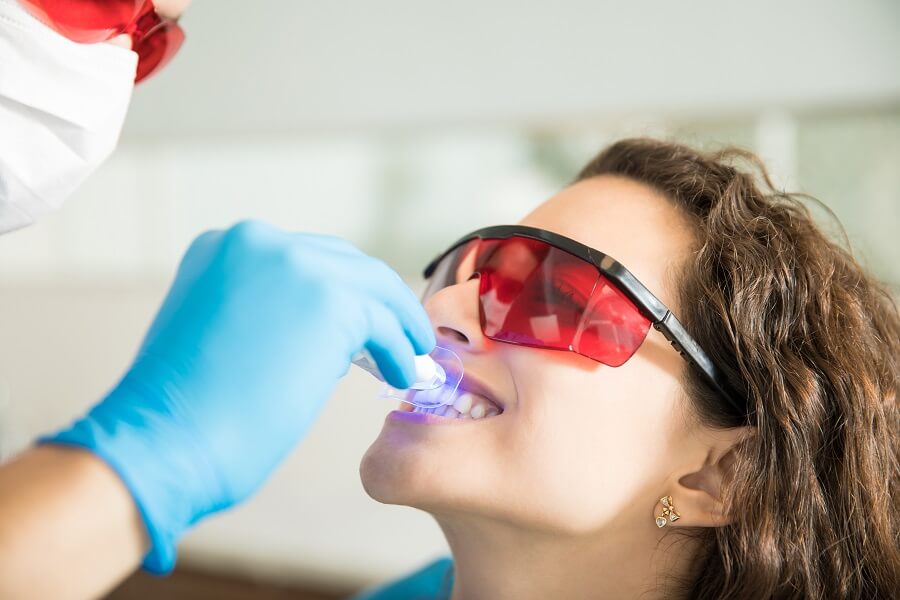Does Teeth Whitening Damage Your Enamel?
A bright and radiant smile is often associated with good oral health and a youthful appearance. As teeth naturally become discolored over time due to factors like aging, certain foods, beverages, and habits like smoking, teeth whitening in The Colony has become a popular cosmetic dental procedure to restore the luster of one’s smile. However, concerns have been raised about the potential impact of teeth whitening on the protective outer layer of teeth called enamel. In this article, we will delve into the enamel enigma and examine the effects of teeth whitening on this crucial part of your smile’s shield.
Understanding the Importance of Enamel
Enamel, the tough outer layer of our teeth, acts as a robust and resilient protective shield. As the hardest substance in the human body, its main role is to safeguard the inner layers of our teeth from potential harm caused by acids, bacteria, and physical wear. Beyond its protective function, enamel is also responsible for giving our teeth their characteristic white color, making it a vital component in maintaining optimal oral health.
How Teeth Whitening Works?
Teeth whitening, also known as teeth bleaching, is a cosmetic dental procedure designed to remove stains and discolorations from the surface of teeth. It typically involves the use of bleaching agents, such as hydrogen peroxide or carbamide peroxide, which penetrate the enamel to break down and eliminate the molecules responsible for staining. The result is a brighter, whiter smile that can boost confidence and enhance one’s appearance.
Potential Impact on Enamel
Concerns about teeth whitening’s impact on enamel have been raised by patients and dental professionals alike. Although professional teeth whitening is generally regarded as safe, it is important to be aware of the potential effects treatment may have on the enamel.
- Tooth Sensitivity
One of the most common side effects of teeth whitening is tooth sensitivity. As the bleaching agents penetrate the enamel, they can reach the underlying dentin, which contains microscopic tubules connected to the nerves of the teeth. This exposure can lead to temporary sensitivity to hot and cold temperatures or certain foods and beverages. However, this sensitivity is usually transient and subsides after a short period. - Enamel Erosion
Too much or improper teeth whitening has the potential to erode the enamel. Because of the weakening or damage to the enamel, teeth become more prone to problems including decay, sensitivity, and discoloration. Follow your dentist’s teeth-whitening recommendations exactly and avoid using whitening solutions excessively without advice from a specialist in order to lower the danger of enamel erosion. - Irritation of Soft Tissues
During teeth whitening procedures, the bleaching agents may come into contact with the soft tissues of the mouth, such as the gums and tongue, leading to irritation or chemical burns. Dental professionals take precautions to protect these tissues during the whitening process, but it is essential to seek professional guidance to ensure safe and effective treatment. - Restored Enamel Surface
While teeth whitening can remove surface stains and discolorations, it does not technically “damage” the enamel in the long term. In fact, it can lead to the restoration of the enamel surface by removing superficial stains that accumulate over time. However, it is crucial to remember that the enamel itself does not regain lost minerals through teeth whitening; its integrity should be maintained through regular oral hygiene practices and dental check-ups.
Safeguarding Your Enamel and Oral Health
To protect your enamel and maintain good oral health while enjoying the benefits of teeth whitening, consider the following tips:
- Consult with a Dental Professional
Consult a dental expert before starting any teeth-whitening procedure. A dentist in The Colony may evaluate the condition of your teeth and gums, suggest the best whitening solution, and make sure that your enamel is not damaged in any way during the whitening procedure. - Follow Professional Recommendations
If you choose an at-home teeth whitening kit provided by your dentist, follow the instructions carefully. Avoid using over-the-counter whitening products without professional guidance, as they may have higher concentrations of bleaching agents and lack the necessary protection for your oral tissues. - Practice Good Oral Hygiene
Maintaining a consistent oral hygiene routine is crucial for preserving enamel health. Brush your teeth twice a day with fluoride toothpaste, floss daily, and visit your dentist regularly for check-ups and professional cleanings. - Limit Staining Foods and Drinks
Minimize the consumption of foods and beverages known to stain teeth, such as coffee, tea, red wine, and dark-colored berries. When you do consume these items, consider using a straw to reduce direct contact with your teeth.
Teeth whitening can be an effective and safe way to achieve a brighter smile. While it may cause temporary tooth sensitivity and requires proper usage to avoid enamel erosion, following professional guidance and maintaining good oral hygiene can safeguard your enamel and oral health. Remember that teeth whitening should always be approached with caution and under the supervision of a dental professional to ensure the best results and minimize any potential risks to your enamel’s protective shield.





 |
|